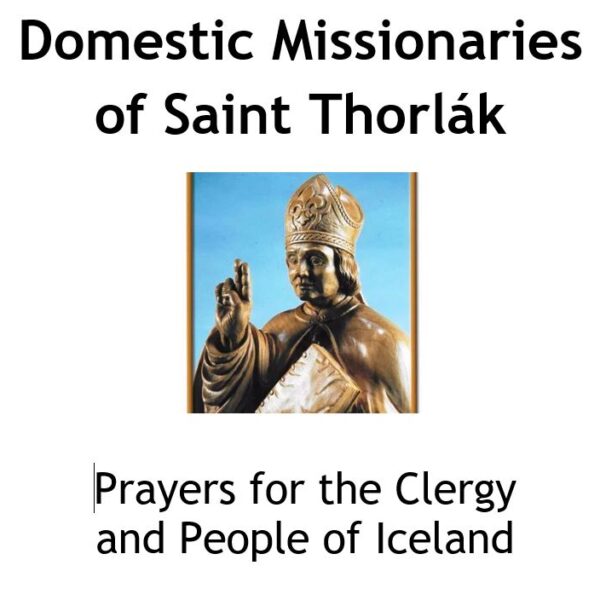Domestic Prayer Missionaries of Saint Thorlak
Tomorrow (14 December) begins the Novena in Honor of Saint Thorlák, prayed during the nine days leading up to his feast day of 23 December.
This year, we would like to suggest praying this novena as a spiritual bouquet to the clergy serving in the Diocese of Reykjavik: offering our prayers for the intentions and wellbeing of its sixteen priests, one deacon and one seminarian.
This bouquet reflects the prayer on a regular basis throughout the year by the Domestic Prayer Missionaries of Saint Thorlák, a volunteer corps of missionaries-in-place whose work is to pray from where we are, in our current circumstances, in our present states of body and mind. We are “domestic,” meaning, staying in place; we pray from wherever we are able to be, transforming “everywhere” into one, common household, one family of God: “Domestic” Missionaries of St. Thorlák do our work from within the “home” of God’s Household. This Domestic form of missionary work differs from that of missionaries who leave home to do their work elsewhere, publicly.
The Domestic Prayer Missionaries’ focus is prayer in any way we are capable, including all forms of communication: fully spoken, low speaking, variably spoken and non-speaking. Our prayer takes the form of however we best express our hearts and intentions to God, in the place best suited to our abilities: at home, in chapel, outdoors; standing, kneeling, sitting, walking; wherever we connect fully with God at any given moment. Many Domestic Missionaries spend their time in prayer before the Blessed Sacrament, but others may pray better in motion. Some “practice the presence of God” throughout the day, offering as we go, and some simply focus on the breath in prayer (e.g., breathe in “My Jesus,” breathe out “Mercy”) to create a “chapel of the heart” wherever we happen to be. Domestic Missionary prayer deliberately minimizes physical and social demands to keep our efforts focused on prayer. We draw special inspiration from the ways of Brother Lawrence of the Resurrection, whose Practice of the Presence of God is an excellent model for anyone, in any state of ability or disability, to offer prayers efficaciously and sincerely alongside those called to more conventional and active forms of missionary work.
To learn more about the Domestic Prayer Missionaries of Saint Thorlák, or to become a Prayer Missionary yourself, download our prayer manual or contact us at AutismConsecrated.Com.
Domestic Missionaries of Saint Thorlak – Prayer Booklet


